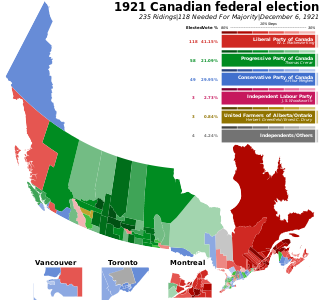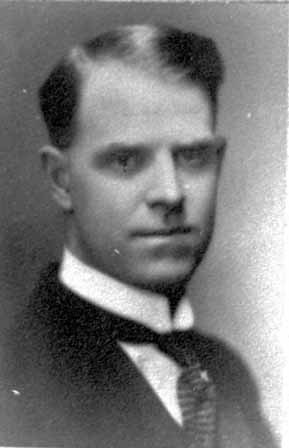Related Research Articles
The Progressive Party of Canada, formally the National Progressive Party, was a federal-level political party in Canada in the 1920s until 1930. It was linked with the provincial United Farmers parties in several provinces, and it spawned the Progressive Party of Saskatchewan, and the Progressive Party of Manitoba, which formed the government of that province. The Progressive Party was part of the farmers' political movement that included federal and provincial Progressive and United Farmers' parties.

The 1921 Canadian federal election was held on December 6, 1921, to elect members of the House of Commons of Canada of the 14th Parliament of Canada. The Union government that had governed Canada through the First World War was defeated, and replaced by a Liberal government under the young leader William Lyon Mackenzie King. A new third party, the Progressive Party, won the second most seats in the election.

William Earl Rowe,, was a politician in Ontario, Canada. He served as the 20th Lieutenant Governor of Ontario from 1963 to 1968.
There have been various groups in Canada that have nominated candidates under the label Labour Party or Independent Labour Party, or other variations from the 1870s until the 1960s. These were usually local or provincial groups using the Labour Party or Independent Labour Party name, backed by local labour councils made up of many union locals in a particular city, or individual trade unions. There was an attempt to create a national Canadian Labour Party in the late 1910s and in the 1920s, but these were only partly successful.
The United Farmers of Ontario (UFO) was an agrarian and populist provincial political party in Ontario, Canada. It was the Ontario provincial branch of the United Farmers movement of the early part of the 20th century.

John Bracken was a Canadian agronomist and politician who was the 11th and longest-serving premier of Manitoba (1922–1943) and later the leader of the Progressive Conservative Party of Canada (1942–1948).
Unity, United Progressive Movement and United Reform were the names used in Canada by a popular front party initiated by the Communist Party of Canada in the late 1930s.
Liberal-Progressive was a label used by a number of candidates in Canadian elections between 1925 and 1953. In federal and Ontario politics there was no Liberal-Progressive Party, as such. The term generally referred to candidates endorsed by Liberal and Progressive constituency associations or to individual candidates who claimed the label, sometimes running against a straight Liberal or straight Progressive candidate. In Manitoba, a party existed with this name provincially, and Liberal-Progressives ran federally in Manitoba under the leadership of Robert Forke, with the support of the Liberal Party.

William Melville Martin served as the second premier of Saskatchewan from 1916 to 1922. In 1916, although not a member of the Legislative Assembly of Saskatchewan, Martin was elected leader of the Saskatchewan Liberal Party, succeeding Premier Walter Scott and thus became Premier of Saskatchewan.

The 1925 Canadian federal election was held on October 29, 1925 to elect members of the House of Commons of Canada of the 15th Parliament of Canada. The Conservative party took the most seats in the House of Commons, although not a majority. Prime Minister William Lyon Mackenzie King's Liberal Party was invited to form a minority government. Unlike the Conservative party, King's Liberals had the conditional support of the many Farmer/Progressive MPs.

The 1945 Canadian federal election was held on June 11, 1945, to elect members of the House of Commons of the 20th Parliament of Canada. Prime Minister William Lyon Mackenzie King's Liberals won a third term. The party fell five seats short of a majority but was able to rule as a majority government with the support of Independent Liberal MPs.
The Liberal–Labour banner has been used several times by candidates in Canadian elections:
William Hooey Spinks was a politician in Manitoba, Canada. He served in the Legislative Assembly of Manitoba from 1920 to 1932, as a member of the Conservative Party.

Joseph Tweed Shaw was a Canadian politician. He served in the House of Commons of Canada from 1921 to 1925 as an independent Labour Member of Parliament (MP), and later became an MLA and leader of the Alberta Liberal Party.
William Gilbert Weir was a Canadian politician and was the longest serving Liberal-Progressive Member of Parliament in Canadian history sitting in the House of Commons of Canada for 27 years.

Donald MacBeth Kennedy was a Canadian farmer as well as a provincial and federal level Canadian politician representing Albertans. He was a UFA MLA 1921-1922 and a Progressive/UFA MP 1921–1935.
Beniah Bowman was an Ontario farmer and political figure. He represented Manitoulin in the Legislative Assembly of Ontario from October 24, 1918 to October 18, 1926 and Algoma East in the House of Commons of Canada from 1926 to 1930 as a United Farmers member.

Arthur Meighen was a Canadian lawyer and politician who served as the ninth prime minister of Canada from 1920 to 1921 and from June to September 1926. He led the Conservative Party from 1920 to 1926 and from 1941 to 1942.
Wilfrid Garfield Case also known as W. Garfield Case,, was a Canadian politician who served as a Progressive Conservative Member of Parliament and Mayor of Owen Sound, Ontario. He is best known for his upset victory over Defence Minister General Andrew McNaughton in the Grey North federal by-election held on 5 February 1945.